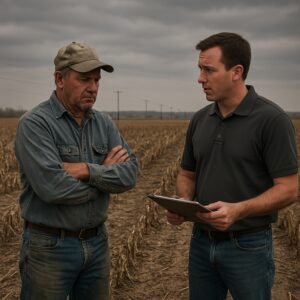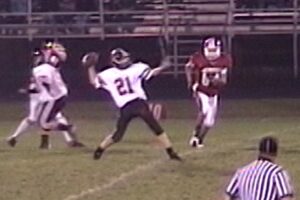Better yet, let’s prove how Invaluable (beyond calculable or appraisable value) you are!
Paperwork gets lost – orders don’t get entered – drivers put products in the wrong bin – sales people forget to write down the correct price – farmers pull feed from the wrong bin – products are mixed incorrectly – seed is sold out even though you ordered it months ago. The list goes on. The caption on the cover photo of this post was “The GPS told me to turn here”
If you sell Ag Products or Services, there is an extremely high likelihood that you will have a customer service disaster in the near future. It happens to all companies, all sizes and in all sectors of the Ag community. It’s one of the major reasons why farmers, livestock producers and Ag Retailers switch who they buy from. So, as a sales person, this subject should be high on your radar of how to gain & retain customers.
Don’t despair when this happens. You have just been given a golden opportunity to prove how valuable you are to your customer. Think about your personal relationships. The strongest ties are most likely with those family and friends that were with you, helped you and supported you in the tough times. Anyone can be there when the going is good. But, we value most those that are there for us in the tough times.
Same holds true for customers. I know it’s frustrating when they happen and worse yet when they happen to THAT Great Account. Here’s what to do and what not to do
Don’t Hide, Run, Duck, Dodge, Dip, Delay, Avoid, Evade or do Anything that looks like you are not aware of and helping resolve the situation. Just like a raffle “You Must Be Present to Win”. Sounds obvious but I have seen sales people do this too often. The thought process is to let the angry customer cool off before contacting them. Bad decision. Most of the time, they cool off by going to your competitor.
Get on the phone, get into the feed mill, elevator, office, on the farm and deal with it. Start with questions. Find out several different versions of what happened. There’s usually three to four at a minimum. Your job can be to sort out which one is the real version. Normally, there is an immediacy to getting the problem remedied and then digging into cause and effect of the mishap. Don’t blame, judge nor accept responsibility at this stage. Just uncover. Do accept responsibility for following through with it until it is resolved to the best of your abilities.
Why is it important to find out what went wrong? While some feel like this is finger pointing, it really is important. First, you want to prevent it from happening in the future. So, if you don’t know the root cause, it’s tough for the sales person to tell the customer that it won’t happen again. Secondly, there is often a financial cost to the mishap. Often, your company is going to absorb most or all of that cost. You want to know this impact when you are dealing with the customer so they understand the financial value that you just brought to their operation. Your supervisor is also going to want to know that financial loss.
Balance the two sides of…. Winning the war/Losing the Battle versus rolling over and giving away the store. Winning the war and losing the battle refers to proving to the customer that it was their fault and you’re not going to compensate them the $150 for the mishap. You save your company $150 and the customer takes their business to the competition, which means you lost the war. That’s poor judgment. However, being easy on paying out claims or not taking a large financial claim serious enough, gives the impression that this is easy and might happen again. It’s a balancing act and you get better at it over time.
So, the next time you have a customer service disaster, look at it as a golden opportunity to strengthen the relationship you have with your customer.
For more on Ag Sales Training, Ag Sales Coaching and Leading Ag Sales Teams, go to http://www.GregMartinelli.net/




